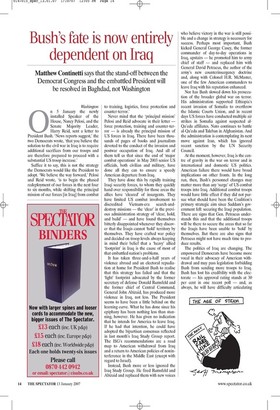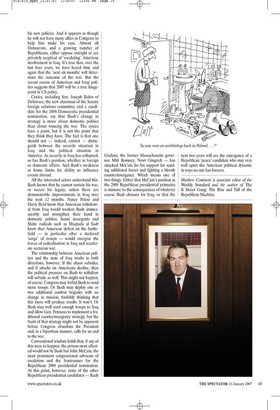Bush's fate is now entirely dependent on Iraq
Matthew Continetti says that the stand-off between the Democrat Congress and the embattled President will be resolved in Baghdad, not Washington Washington n 5 January the newly installed Speaker of the House, Nancy Pelosi, and the Senate Majority Leader, Harry Reid, sent a letter to President Bush. 'News reports suggest,' the two Democrats wrote, 'that you believe the solution to the civil war in Iraq is to require additional sacrifices from our troops and are therefore prepared to proceed with a substantial US troop increase.'
Suffice it to say, this is not the strategy the Democrats would like the President to adopt. 'We believe the way forward,' Pelosi and Reid wrote, 'is to begin the phased redeployment of our forces in the next four to six months, while shifting the principal mission of our forces [in Iraq] from combat to training, logistics, force protection and counter-terror.'
Never mind that the 'principal mission' Pelosi and Reid advocate in their letter — force protection, training and counter-terror — is already the principal mission of US forces in Iraq. There have been thousands of pages of books and journalism devoted to the conduct of the invasion and postwar occupation of Iraq. And all of them tell us that since the end of 'major combat operations' in May 2003 senior US officials, both civilian and military, have done all they can to ensure a speedy American departure from Iraq.
They have done this by rapidly training Iraqi security forces, to whom they quickly hand over responsibility for those areas the allies have 'cleared' of insurgents. They have limited US combat involvement to discredited Vietnam-era search-anddestroy missions — the 'clear' in the previous administration strategy of 'clear, hold, and build' — and have found themselves bitterly disappointed whenever they discover that the Iraqis cannot 'hold' territory by themselves. They have crafted war policy and decided on troop levels always keeping in mind their belief that a 'heavy' allied 'footprint' in Iraq is the cause of most of that embattled nation's problems.
It has taken three-and-a-half years of violence abroad and an electoral repudiation at home for President Bush to realise that this strategy has failed and that the 'light' footprint advocated by the former secretary of defense Donald Rumsfeld and the former chief of Central Command, General John Abizaid, has produced more violence in Iraq, not less. The President seems to have been a little behind on the learning curve. What he has done since his epiphany has been nothing less than stunning, however. He has given no indication that he intends for America to leave Iraq. If he had that intention, he could have adopted the bipartisan consensus reflected in last month's Iraq Study Group report. The ISG's recommendations are a road map to American withdrawal from Iraq and a return to American policies of noninterference in the Middle East (except with regard to Israel).
Instead, Bush more or less ignored the Iraq Study Group. He fired Rumsfeld and Abizaid and replaced them with new voices who believe victory in the war is still possible and a change in strategy is necessary for success. Perhaps most important, Bush kicked General George Casey, the former commander of day-to-day operations in Iraq, upstairs — he promoted him to army chief of staff — and replaced him with General David Petraeus, the author of the army's new counterinsurgency doctrine and, along with Colonel H.R. McMaster, one of the few American commanders to leave Iraq with his reputation enhanced.
Nor has Bush slowed down his prosecution of the broader global war on terror. His administration supported Ethiopia's recent invasion of Somalia to overthrow the Islamic Courts Union, and in recent days US forces have conducted multiple air strikes in Somalia against suspected alQa'eda affiliates. Nato continues to battle al-Qa'eda and Taleban in Afghanistan. And the administration is contemplating its next move against Iran, which has ignored recent sanction by the UN Security Council.
At the moment, however, Iraq is the centre of gravity in the war on terror and in international and domestic US politics. American failure there would have broad implications on other fronts. In the long run, then, Bush's personnel changes may matter more than any 'surge' of US combat troops into Iraq. Additional combat troops would have little effect if they did not pursue what should have been the Coalition's primary strategic aim since Saddam's government fell: securing the Iraqi population. There are signs that Gen. Petraeus understands this and that the additional troops will be there to secure the areas that so far the Iraqis have been unable to 'hold' by themselves. But there are also signs that Petraeus might not have much time to produce results.
The politics of Iraq are changing. The empowered Democrats have become more vocal in their advocacy of American withdrawal and may pass legislation forbidding Bush from sending more troops to Iraq. Bush has lost his credibility with the electorate — his approval rating stands at 30 per cent in one recent poll — and, as always, he will have difficulty articulating his new policies. And it appears as though he will not have many allies in Congress to help him make his case. Almost all Democrats, and a growing number of Republicans, either oppose outright or are privately sceptical of 'escalating' American involvement in Iraq. It's true that, over the last four years, we have heard time and again that the 'next six months' will determine the outcome of the war. But the recent course of American and Iraqi politics suggests that 2007 will be a true hingepoint in US policy.
Cynics, including Sen. Joseph Biden of Delaware, the new chairman of the Senate foreign relations committee and a candidate for the 2008 Democratic presidential nomination, say that Bush's change in strategy is more about domestic politics than about winning the war. The cynics have a point, but it is not the point that they think they have. The fact is that one should not — indeed, cannot — distinguish between the security situation in Iraq and the political situation in America. As security in Iraq has collapsed, so has Bush's position, whether in foreign or domestic affairs. And Bush's weakness at home limits his ability to influence events abroad.
All the interested actors understand this. Bush knows that he cannot sustain his war, or secure his legacy, unless there are demonstrable improvements in Iraq over the next 12 months. Nancy Pelosi and Harry Reid know that American withdrawal from Iraq would weaken Bush immeasurably and strengthen their hand in domestic politics. Sunni insurgents and Shiite radicals such as Muqtada al Sadr know that American defeat on the battlefield — in particular after a declared 'surge' of troops — would energise the forces of radicalisation in Iraq and accelerate sectarian war.
The relationship between American politics and the state of Iraq works in both directions, however. If the chaos subsides, and if attacks on Americans decline, then the political pressure on Bush to withdraw will subside as well. This might not happen, of course. Congress may forbid Bush to send more troops. Or Bush may deploy one or two additional combat brigades with no change in mission, foolishly thinking that this move will produce results. It won't. Or Bush may well send enough troops to Iraq and allow Gen. Petraeus to implement a traditional counterinsurgency strategy, but the fruits of that strategy might not be apparent before Congress abandons the President and, in a bipartisan manner, calls for an end to the war.
Conventional wisdom holds that, if any of this were to happen, the person most affected would not be Bush but John McCain, the most prominent congressional advocate of escalation and the frontrunner for the Republican 2008 presidential nomination. At this point, however, none of the other Republican presidential candidates — Rudy Giuliani, the former Massachusetts governor Mitt Romney, Newt Gingrich — has attacked McCain for his support for sending additional forces and fighting a bloody counterinsurgency. Which means one of two things. Either that McCain's position in the 2008 Republican presidential primaries is immune to the consequences of whatever course Bush chooses for Iraq, or that the next two years will see the emergence of a Republican 'peace' candidate who may very well upset the American political dynamic in ways no one has forseen.
Matthew Continetti is associate editor of the Weekly Standard and the author of The K Street Gang: The Rise and Fall of the Republican Machine.























































 Previous page
Previous page